Suk-in Chang. Modern Conversational Korean
Подождите немного. Документ загружается.

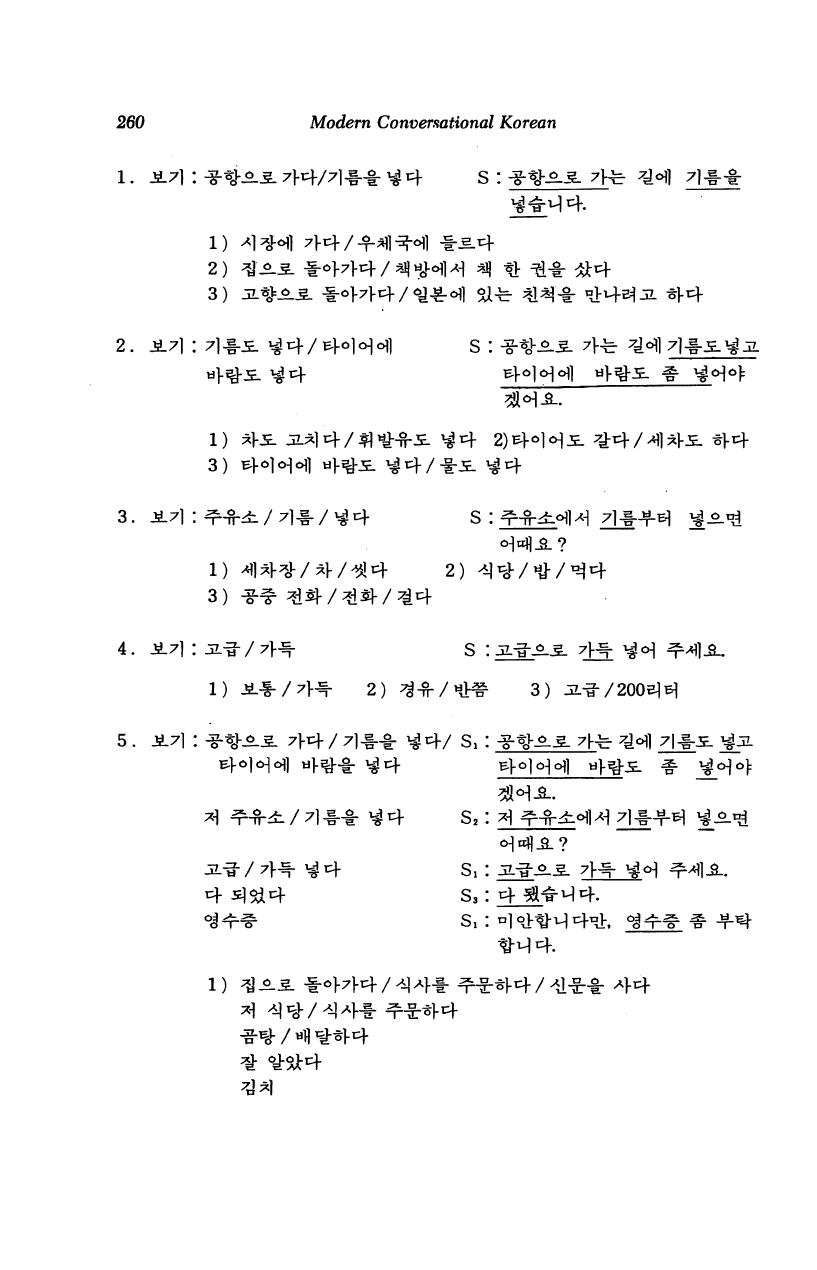
260
Modern
Conversational
Korean
2)
3)
2.
3)
3.
3)
4.
Ji.7l
:
jBL-i-/7]^-
5.
2)
S
:
W°
s
:
2)
S
I^SJ
ft*
3)
s,:
-g-^-g-
7|**
>#4
^4
S,
s,
s,
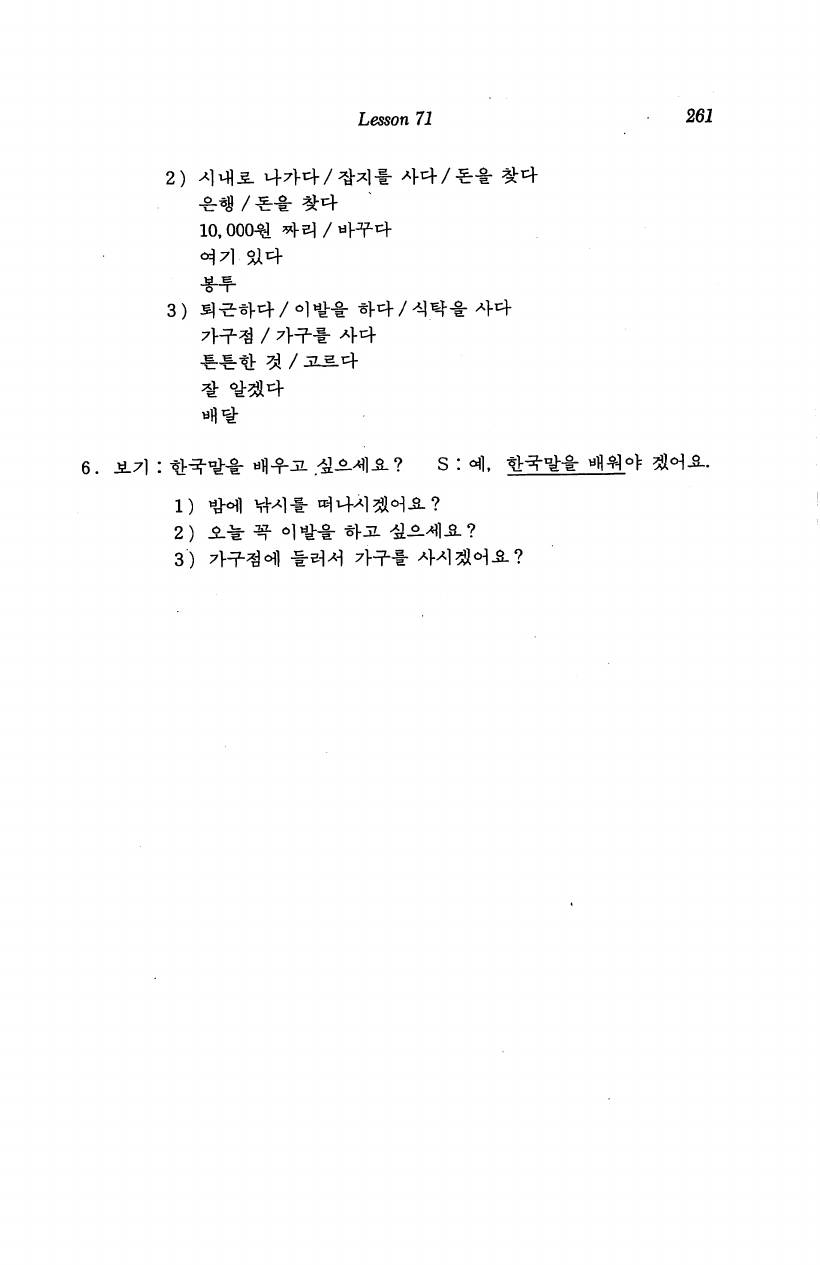
Lesson
71
261
2)
4^iL
4^4/^l*
44/-
**3/-&*
#4
10,000^
*>
El/
3
)
6.
M*
H
44
2)
i-i-
I*-
ol^-lr
*1-J2.
3)
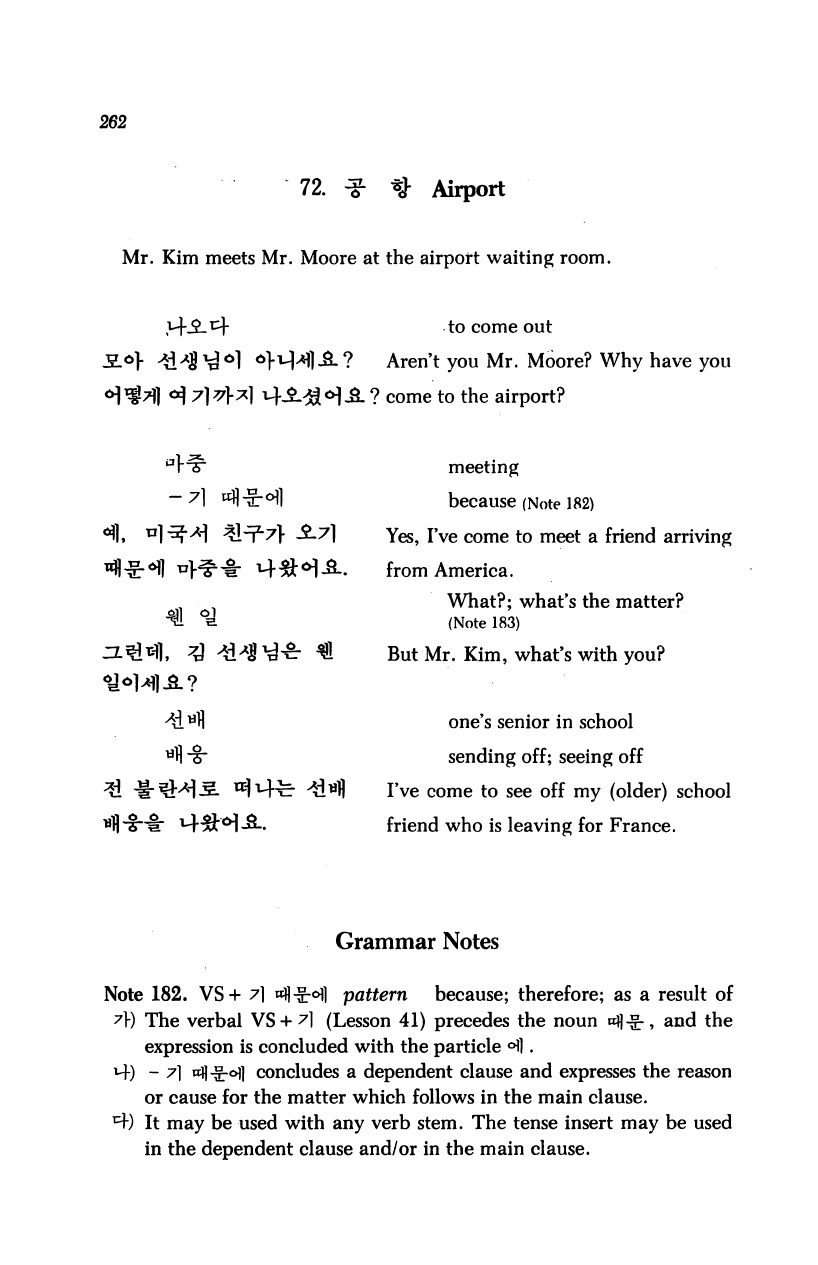
262
72.
^
^
Airport
Mr.
Kim
meets
Mr.
Moore
at
the
airport
waiting
room.
to
come
out
*}i-M|J8-?
Aren't
you
Mr.
Moore?
Why
have
you
?
come
to
the
airport?
meeting
—
7]
wfl
it-
ofl
because
(Note
182)
Yes,
I've
come
to
meet
a
friend
arriving
from
America.
What?;
what's
the
matter?
(Note
183)
But
Mr.
Kim,
what's
with
you?
one's
senior
in
school
sending
off;
seeing
off
I've
come
to
see
off
my
(older)
school
friend
who
is
leaving
for
France.
Grammar
Notes
Note
182.
VS+
7]
nfl-g-ofl
pattern
because;
therefore;
as
a
result
of
7r)
The
verbal
VS
+
^1
(Lesson
41)
precedes
the
noun
«fl^-,
and
the
expression
is
concluded
with
the
particle
°fl
.
i~f)
-
7]
ttfl-§:*>fl
concludes
a
dependent
clause
and
expresses
the
reason
or
cause
for
the
matter
which
follows
in
the
main
clause.
^W
It
may
be
used
with
any
verb
stem.
The
tense
insert
may
be
used
in
the
dependent
clause
and/or
in
the
main
clause.
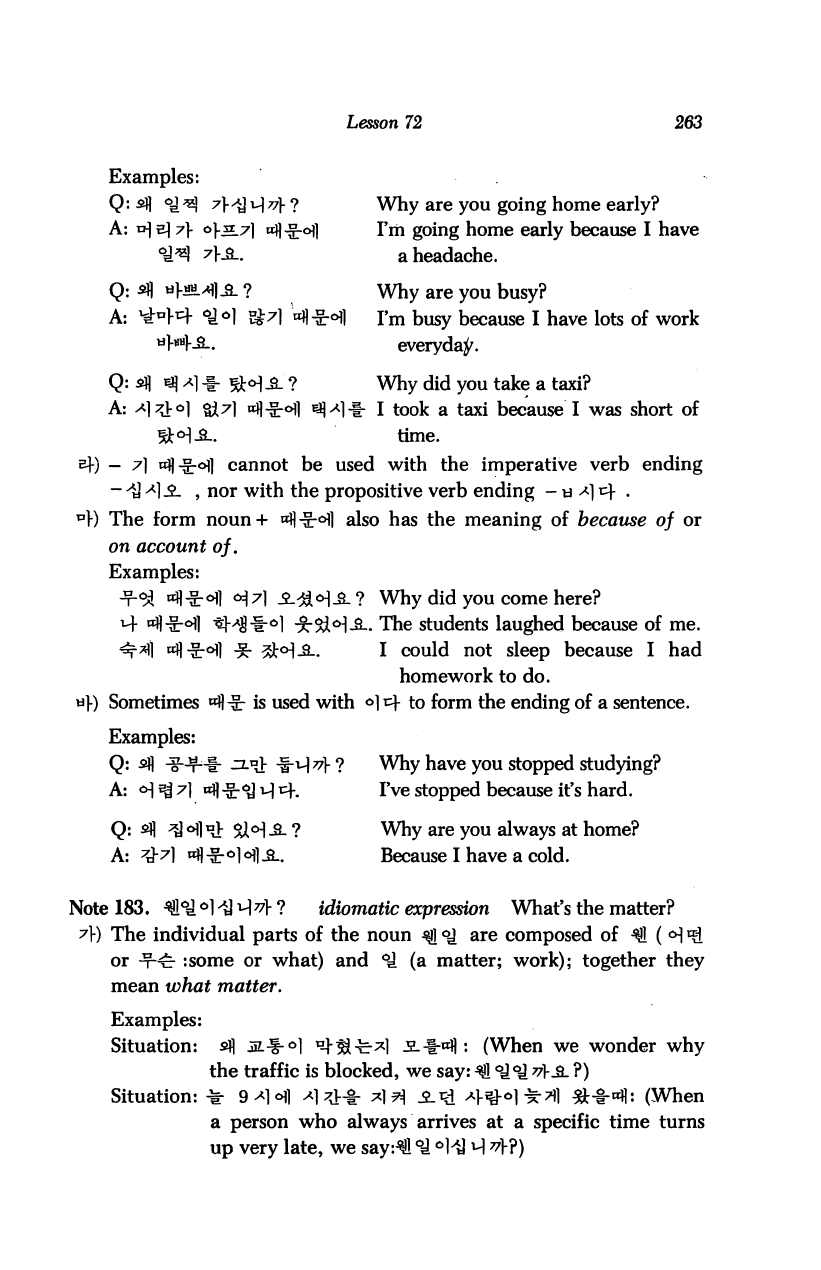
Lesson
72
263
Examples:
Q:
sfl
A:
v]
^
1^77}
?
Q:
sfl
A:
^
Q:
sfl
A:
7]-
°}^
V««4^?
<fi°l
Bt^l
=«fl-Sr*HH
-I-
sf)
-
Why
are
you
going
home
early?
I'm
going
home
early
because
I
have
a
headache.
Why
are
you
busy?
I'm
busy
because
I
have
lots
of
work
everyday.
Why
did
you
take
a
taxi?
1
took
a
taxi
because
I
was
short
of
time,
cannot
be
used
with
the
imperative
verb
ending
-
^
>*]-£-
,
nor
with
the
propositive
verb
ending
-
The
form
noun+
on
account
of.
Examples:
also
has
the
meaning
of
because
of
or
Sometimes
Why
did
you
come
here?
.
The
students
laughed
because
of
me.
I
could
not
sleep
because
I
had
homework
to
do.
is
used
with
o]
t\-
to
form
the
ending
of
a
sentence.
Examples:
Q:
sfl
A:
<H
^
t\
"fl
-Sr^J
H
^
Q:
A:
^
ofl«>-
Si<H-2-
?
Why
have
you
stopped
studying?
IVe
stopped
because
it's
hard.
Why
are
you
always
at
home?
Because
I
have
a
cold.
Note
183.
^ffl°J
°1
^
M^>
?
idiomatic
expression
What's
the
matter?
7]-)
The
individual
parts
of
the
noun
^
°J
are
composed
of
^1
(
or
^^
:some
or
what)
and
°J
(a
matter;
work);
together
they
mean
what
matter.
Examples:
Situation:
sfl
^l^-^}
^S-b*l
i*«fl
:
(When
we
wonder
why
the
traffic
is
blocked,
we
say:
^
°J°J
v\3.
?)
Situation:
^
9*l°fl
^1^4-
^1^
^.Pi
a^oI^-tII
^t*nfl:
(When
a
person
who
always
arrives
at
a
specific
time
turns
up
very
late,
we
say:^!
°J
°l
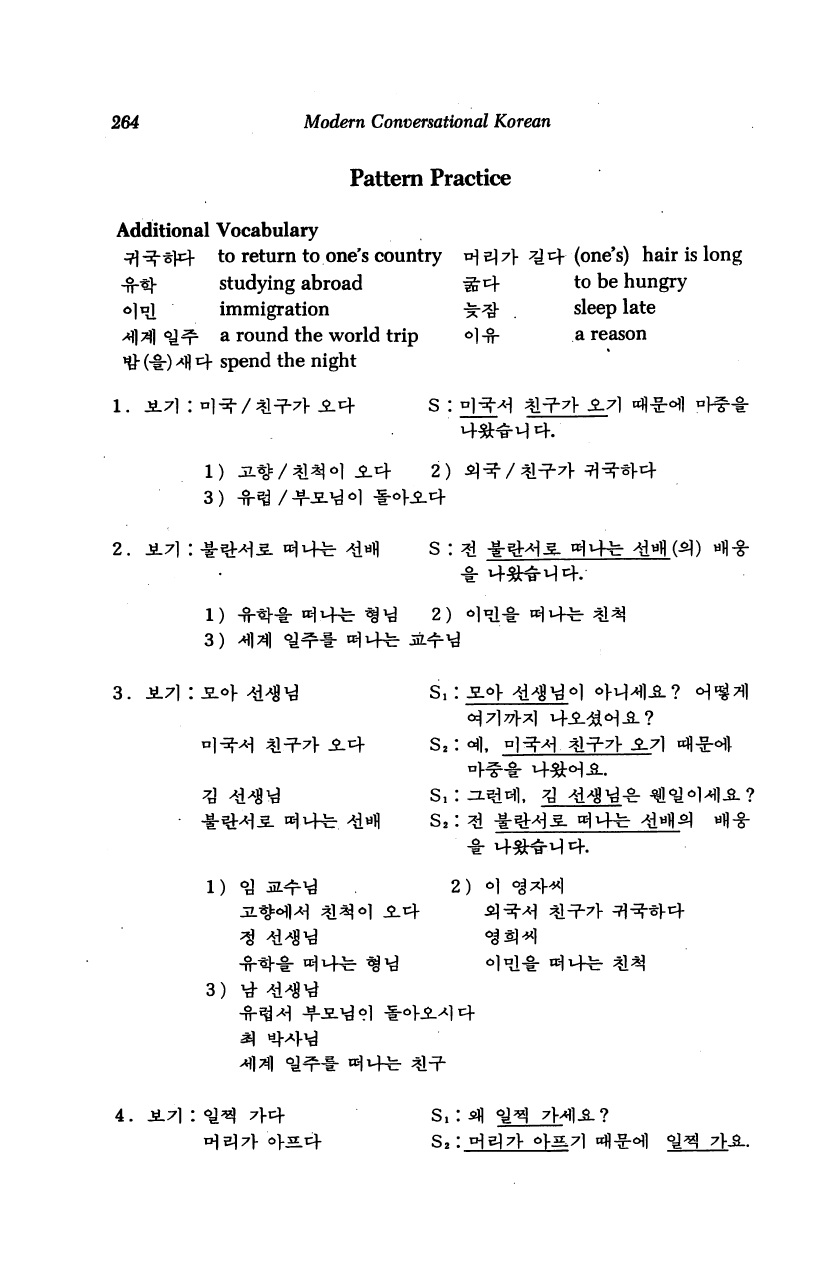
264
Modern
Conversational
Korean
Pattern
Practice
Additional
Vocabulary
j\
-%~s]c\-
to
return
to
one's
country
a]
e)
7}
studying
abroad
#cf
immigration
^-^
.
a
round
the
world
trip
°l-5f-
*#
(-§-)
-*fl
4
spend
the
night
1.
Jt7i:
2.
3.
3)
3)
3)
s
:
2)
2)
s,
2)
(one's)
hair
is
long
to
be
hungry
a
reason
4.
s,:
s8
:
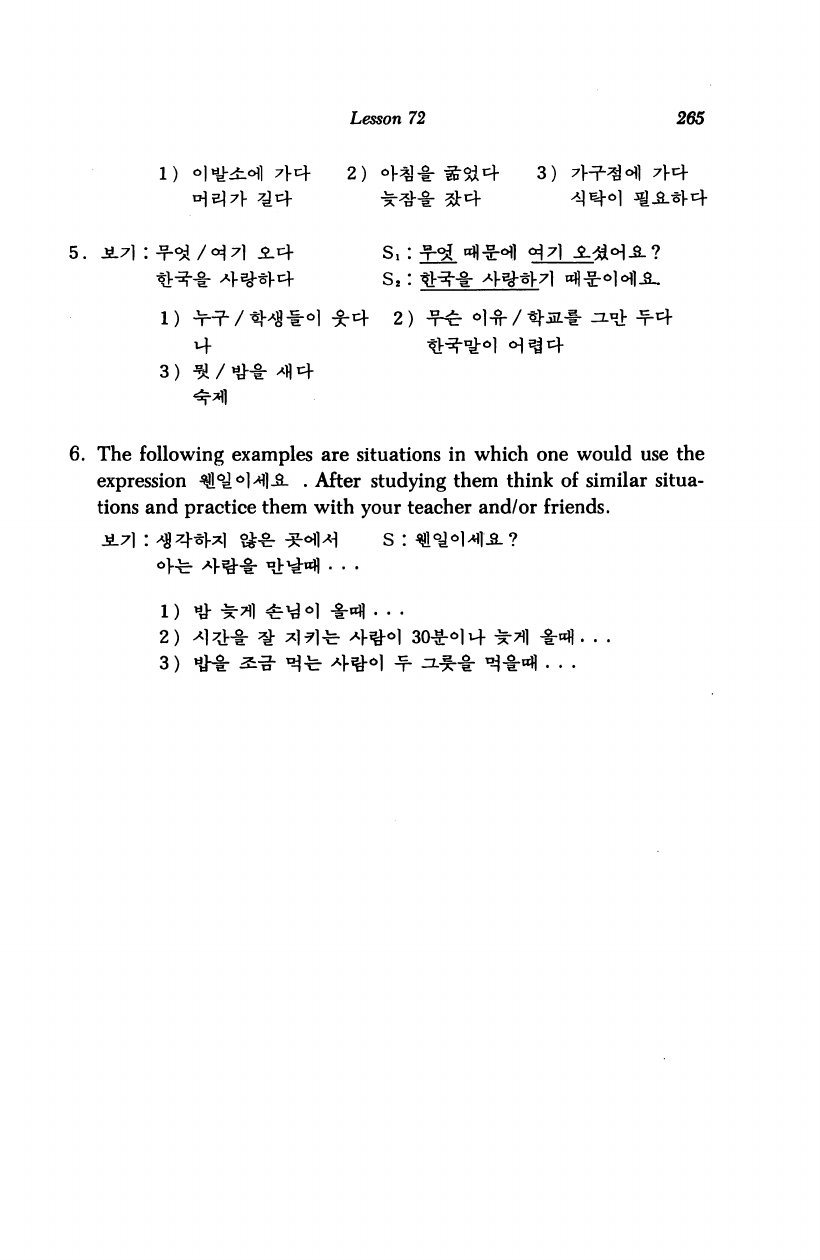
Lesson
72
265
3)
5.
2)
4
3)
^
6.
The
following
examples
are
situations
in
which
one
would
use
the
expression
^lojol4].a.
.
After
studying
them
think
of
similar
situa
tions
and
practice
them
with your
teacher
and/or
friends.
.SL7):
>|zi*M $-&
-3WH
s
•Vte-
2)
3)
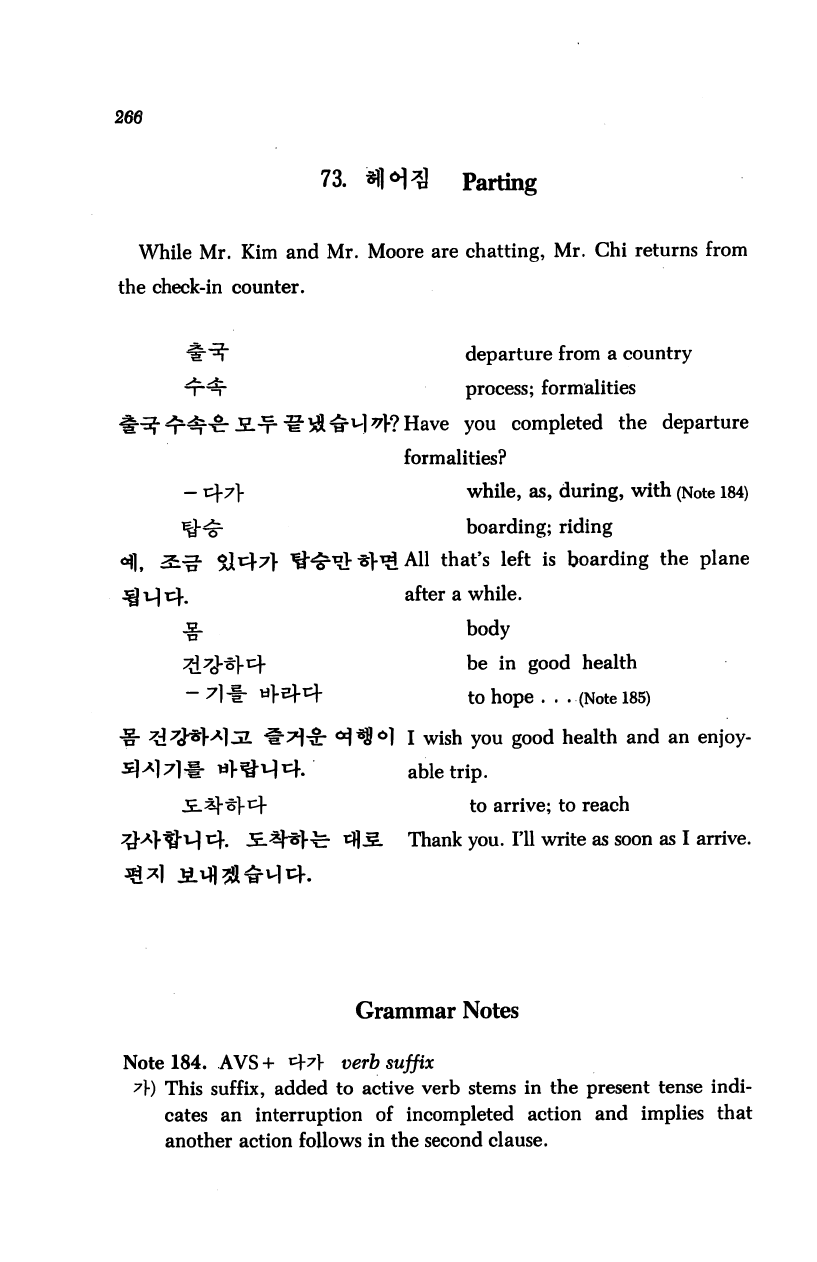
73.
Parting
While
Mr.
Kim
and
Mr.
Moore
are
chatting,
Mr.
Chi
returns
from
the
check-in
counter.
-g.
departure
from
a
country
process;
formalities
you
completed
the
departure
formalities?
while,
as,
during,
with
(Note
184)
boarding;
riding
All
that's
left
is
boarding
the
plane
after
a
while.
body
De
m
good
health
to
hope
.
.
.
(Note
185)
I
wish
you
good
health
and
an
enjoy-
able
trip.
to
arrive;
to
reach
Thank
you.
Fll
write
as
soon
as
I
arrive.
Grammar
Notes
Note
184.
AVS+
4*r
verb
suffix
A)
This
suffix,
added
to
active
verb
stems
in
the
present
tense
indi
cates
an
interruption
of
incompleted
action
and
implies
that
another
action
follows
in
the
second
clause.
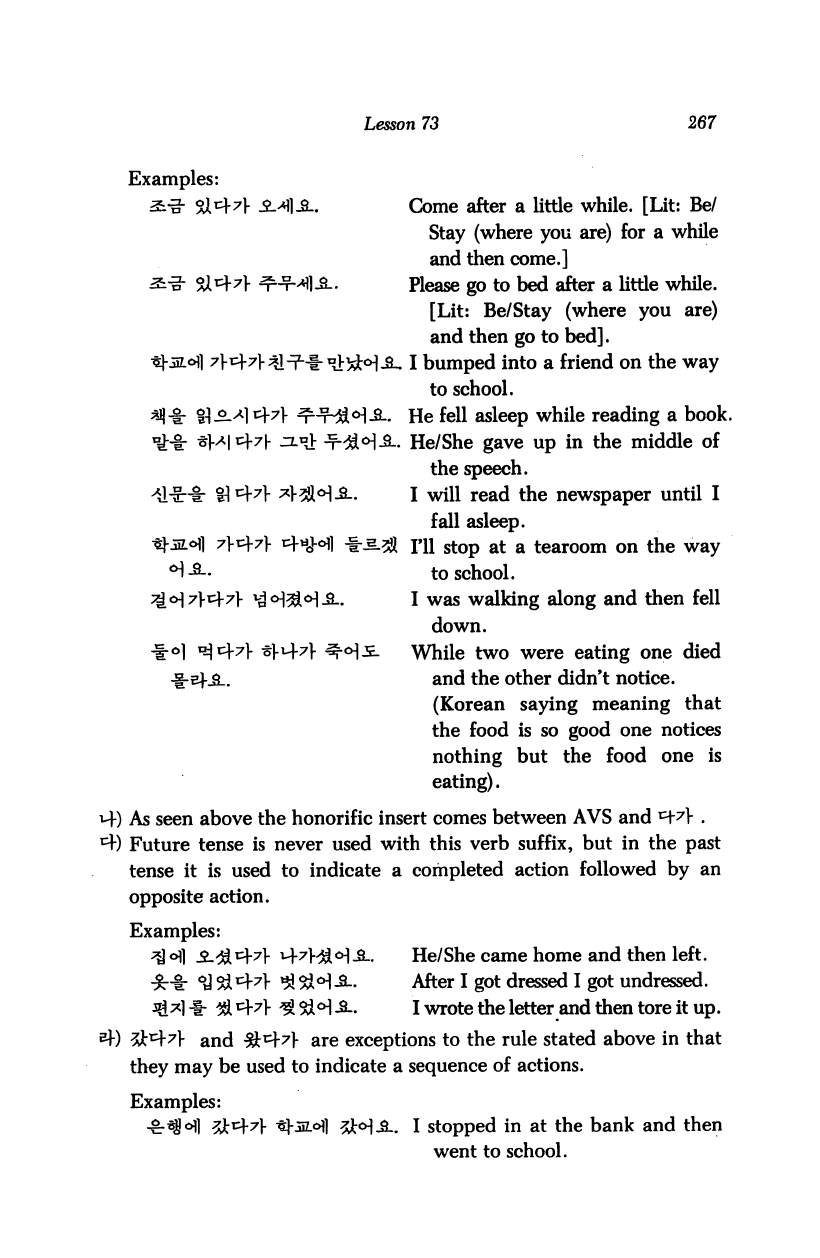
Lesson
73
267
Examples:
9X^7}
81-2-^1471-
Come
after
a
little
while.
[Lit:
Be/
Stay
(where
you
are)
for
a
while
and
then
come.]
please
go
to
bed
after
a
little
while.
[Lit:
Be/Stay
(where
you
are)
and
then
go
to
bed].
I
bumped
into
a
friend
on
the
way
to
school.
He
fell
asleep
while
reading
a
book.
He/She
gave
up
in
the
middle
of
the
speech.
I
will
read
the
newspaper
until
I
fall
asleep,
ni
stOp
at
a
tearoom
on
the
way
to
school.
I
was
walking
along
and
then
fell
down.
While
two
were
eating
one
died
and
the
other
didn't
notice.
(Korean
saying
meaning
that
the
food
is
so
good one
notices
nothing
but
the
food
one
is
eating).
M-)
As
seen
above
the
honorific
insert
comes
between
AVS
and
4)
Future
tense
is
never
used
with
this
verb
suffix,
but
in
the
past
tense
it is
used
to
indicate
a
completed
action
followed
by
an
opposite
action.
Examples:
^
o\]
3-<&i=)-7}
^7}>£o]£_.
He/She
came
home
and
then
left.
7V
^
3M-S-.
After
I
got
dressed
I
got
undressed.
I
wrote
the
letter
and
then
tore
it
up.
and
fk&A
are
exceptions
to
the
rule
stated
above
in
that
they
may
be
used
to
indicate
a
sequence
of
actions.
Examples:
.
I
stopped
in at
the
bank
and
then
went
to
school.
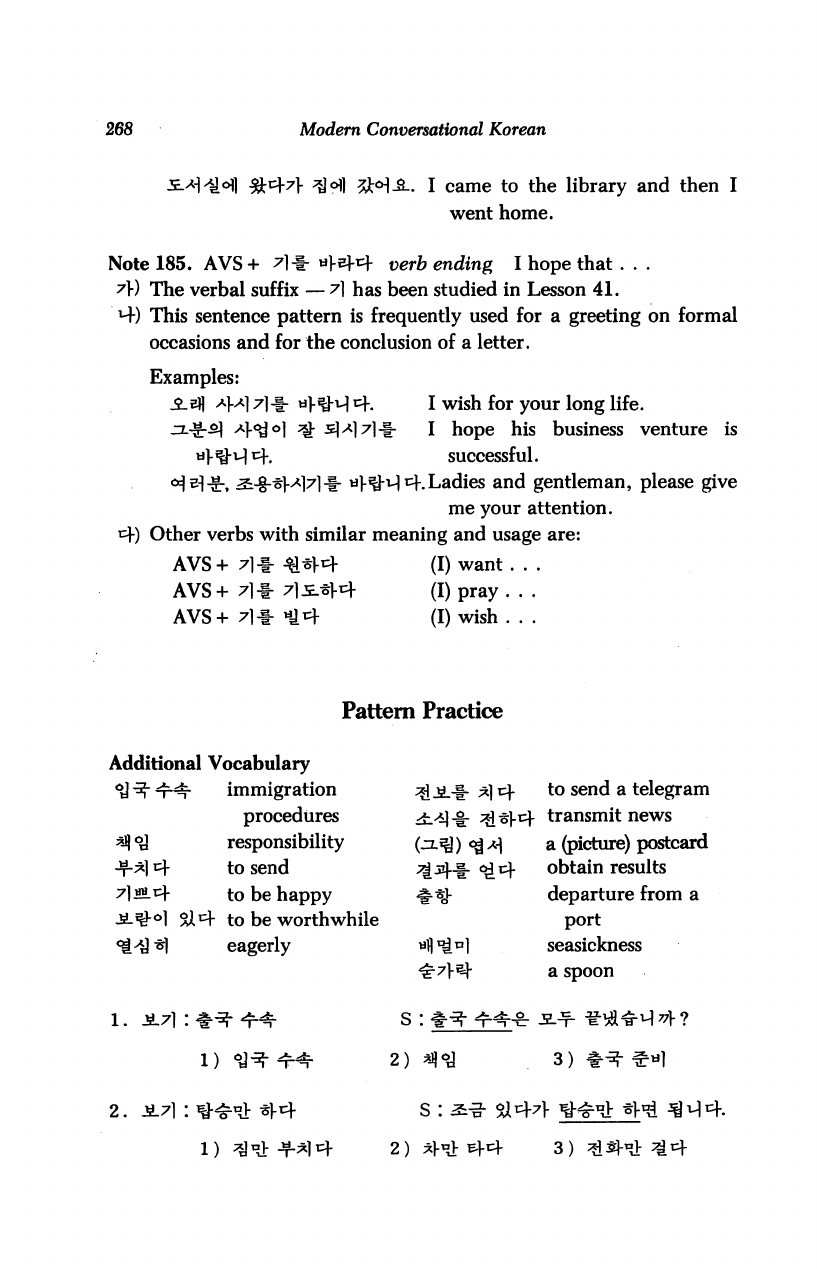
268
Modern
Conversational
Korean
SH-&-.
I
came
to
the
library
and
then
I
went
home.
Note
185.
AVS
+
^1-i-
»\?\-*\
verb
ending
I
hope
that
.
.
.
A)
The
verbal
suffix
—
A
has
been
studied
in
Lesson
41.
*+)
This
sentence
pattern
is
frequently
used
for
a
greeting
on
formal
occasions
and
for
the
conclusion
of
a
letter.
Examples:
*M17lir
I
wish
for
your
long
life.
I
hope
his
business
venture
is
successful.
+.Ladies
and
gentleman,
please
give
me
your
attention.
Other
verbs
with
similar
meaning
and
usage
are:
AVS
+
7}%
*bftx\
(I)
want
. . .
AVS+
71-1-
7\s^r\
(I)
pray
. .
.
AVS+
71-1-
^4
(I)
wish
. . .
Pattern
Additional
Vocabulary
<y
^-
4^
immigration
procedures
^
*&
responsibility
-r-*l
^r to
send
7l
«M.r^
to
be
happy
£-*Q-°]
9X^
to
be
worthwhile
^>y
^1
eagerly
1.
Ji7l
:
#^-
4=-^
S
1>«***
2)
2.
£-7)
:
^-^J:
*V4
Practice
3l
JL^-
^1
cf to
send
a
telegram
^>i]-§.
^i^l-14
transmit
news
(jx^
)
<^
x\
a
(picture)
postcard
^jzf^-
<^cf
obtain
results
^^-
departure
from
a
port
tffl^l
seasickness
^7\ty
a
spoon
2)
3)
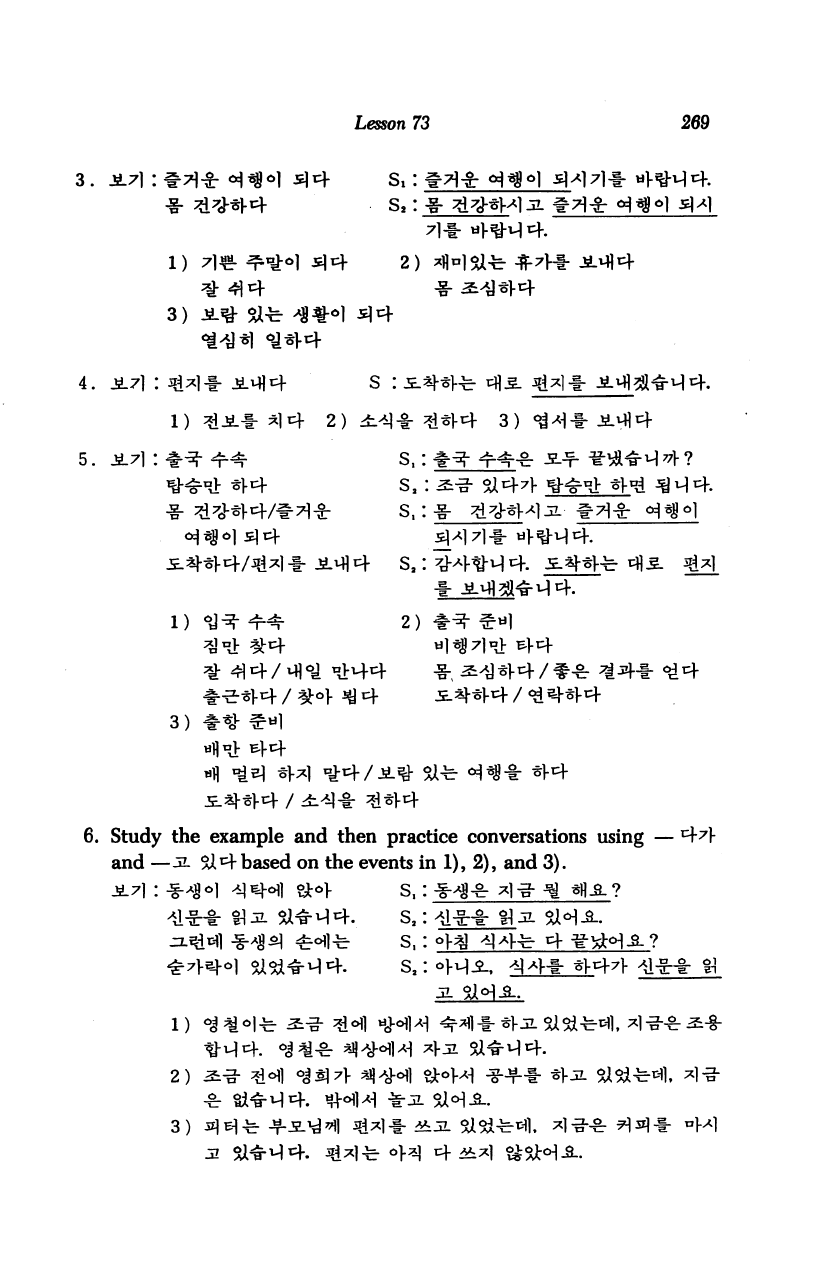
Lesson
73
269
3.
JL7]:
3)
4.
5.
s,:
s,:
-g-
j
7M-41H4.
2)
S
:
2)
s,:
s,:
i-
s,:
-g-
2)
<
4
Stl-
It
6.
Study
the
example
and
then
practice
conversations
using
and
—JL
3X^\based
on
the
events
in
1),
2),
and
3).
sa*M4.
s2:
s,
sa:
2)
3)
